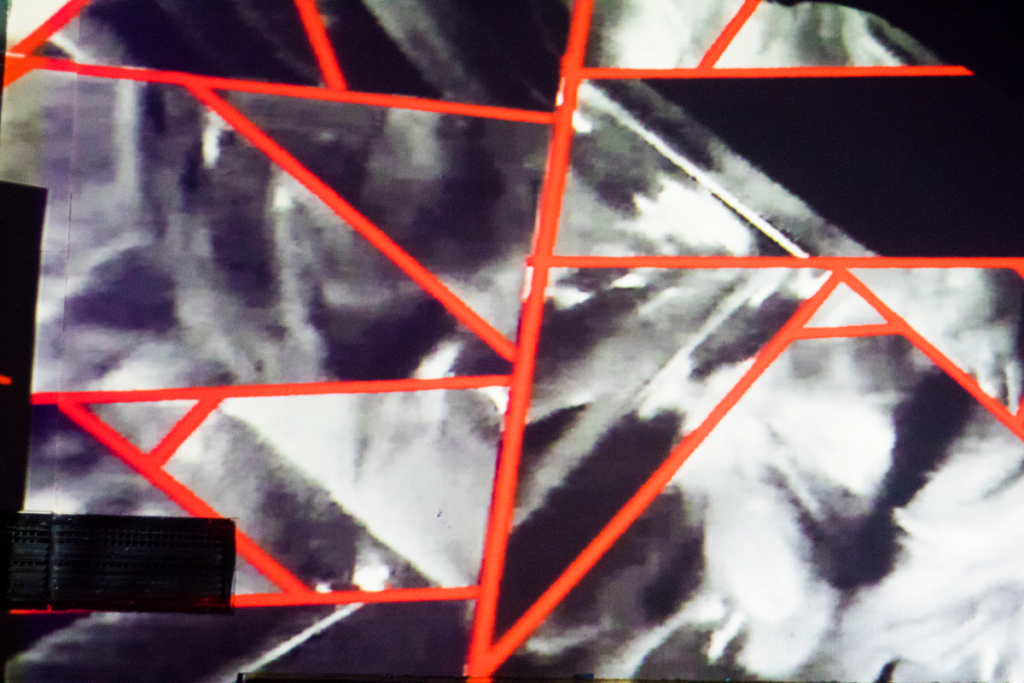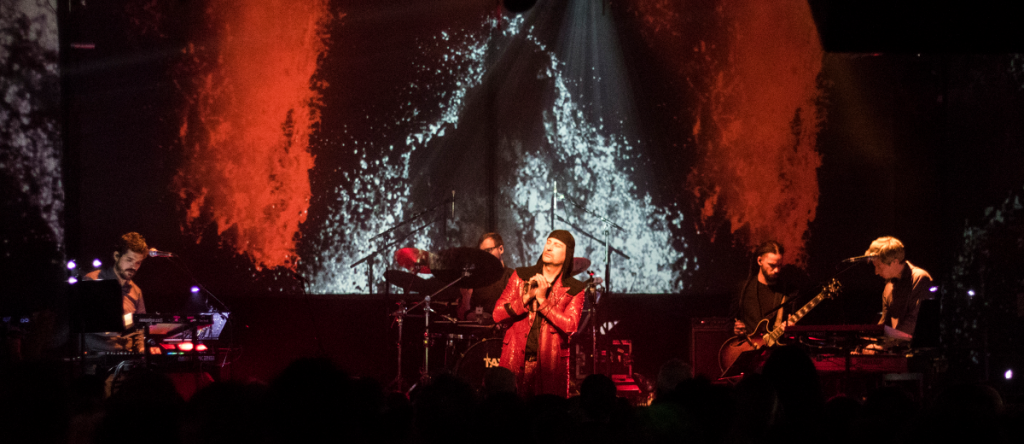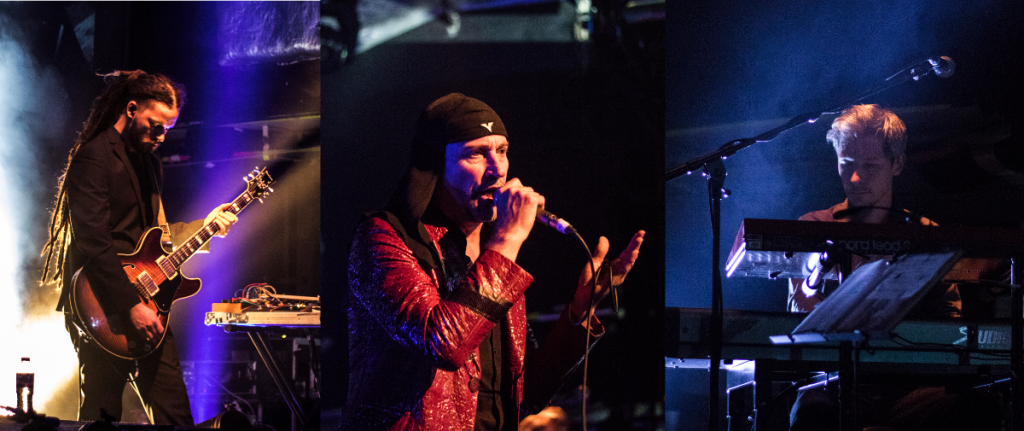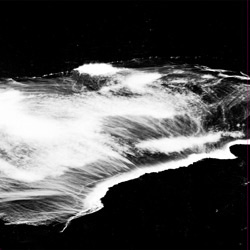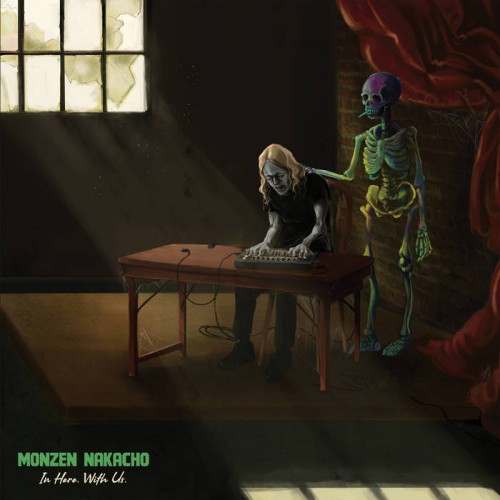London
23 November 2017
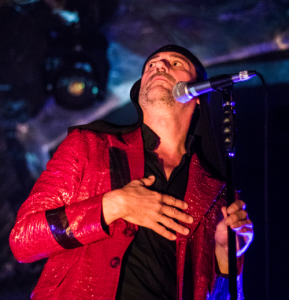 “Dunkel. Dunkel ist die Nacht“.i
“Dunkel. Dunkel ist die Nacht“.i
It is most certainly dark tonight, the evenings now well and truly drawn. The winter solstice approaches. And, as is customary for such astronomical phenomena, we are gathering together tonight to celebrate by watching the rise of the strange, intense sun that is Laibach.
Given that only two years ago Laibach, famously, became the first band to perform in the paranoid garrison state of North Korea,ii the choice of the O2 Islington Academy feels a curiously bathetic one. Having spent the last few days marinating myself in the sinister majesty of their new album, Also Sprach Zarathustra, I can’t help but feel that, rightfully, I should now surely be approaching a gravel pit near Srebrenica, or a disused factory in the Ruhrgebiet or even, closer to home, the massive, eviscerated carcass of Battersea Power Station. A shopping centre in Islington seems somehow to lack the requisite edge of shadowy grandeur, of overwhelming scale where unspoken ontological dread can lurk threateningly in the shadows of one’s peripheral vision.
Putting such qualms aside, I climb the stairs to the auditorium, and am confronted immediately by the merch stall and the uncompromising geometry of its wares. Crosses and flashes are everywhere, their angular and disagreeable potency impossible to ignore.iii Rendered in red and black, all the classic Laibach T-shirts are here: The Sound of Music AK47, the Marx bust Wirtschaft Ist Tod, the ‘Freedom of speech go to Hell!’ logo. In the current climate, where words are so evidently weaponised and every utterance in the public sphere is dissected and assessed for its adherence to ideological purity – with those found guilty of being counter-revolutionaries pilloriediv – Laibach’s flagrant transgression of these new and bizarre norms is utterly delicious. Their intention is, and has been for approaching forty years, the creation of radically unsafe spaces where satire, cognitive dissonance, intimidation and deliberate, pungent ambiguity can run riot. Not to mention a large dollop of poker-faced humour. There are no soothing answers here, no comforting – but hollow – bromides, just uneasy questions to which, most troublingly of all, there may be no palatable answers. Critics would often level the charge of ‘totalitarianism’ at them, but to collapse their interpretation to a single dimension always said much more about the limited perception of accuser than it did about the band. Coming from the former Yugoslavia, whose unique brand of communism always placed it as something of a fulcrum between the old Cold War East and West, their genius was always to be able to see, imitate and critique the attributes of each side in the troubled duality. They recognised decades ago that, like Groucho Marx’s classic mirror sequence in Duck Soup, the two former adversaries risked emulating each other for so long, that they would inevitably take on many of each other’s worst characteristics.As Number 2 tells Number 6 in “The Chimes of Big Ben”, the second episode of The Prisoner, “…both sides are becoming identical. What in fact has been created is an international community, a perfect blueprint for world order. When the sides facing each other suddenly realize that they’re looking into a mirror, they will see that ‘this’ is the pattern for the future.” And lo, did it come to pass. “Battle ye not against monsters, lest ye become a monster. And remember that when you gaze into the void, the void gazes also into you”. Patrick McGoohan or Friedrich Nietzsche, Laibach are a comfortable fit with both.
And talking of Friedrich Nietzsche… We are drawn here tonight to hear the astonishing material from Also Sprach Zarathustra, released earlier in the summer. It was originally composed for a theatrical production of Nietzsche’s titular novel, directed by Matjaž Berger for the Anton Podbevšek Theatre (APT) in Novo Mesto, Slovenia, and will comprise the first three quarters of tonight’s set. Ranging from the merely disquieting to the outright menacing, I – and many of those who I have spoken to about it – feel intuitively that it may represent a new high watermark in the band’s career. It has all the trademark Laibach intensity and motive power, yet with a delicate beauty and a Spartan economy that is quite breathtaking.With ten minutes to go, I notice that the guy in front of me seems to be operating a brown hedgehog glove puppet, one with a small badge attached to its ear saying simply ‘Cure’. Whether this means that the hedgehog is some form of animal-assisted therapy, or instead a fan of Robert Smith’s band of happy minstrels, remains obscure. Certainly many passers-by, on seeing its cheery little face, appear to be stopping for a chat with its operator. Later, twenty or so minutes into the set, he will take out a small sketchbook and proceed to render quite a pleasing black and white line drawing of the band on stage – a not unimpressive feat given all the jostling and general kineticism of the crowd.
At precisely nine o’clock, the ambient music begins to fade away to be gently replaced by the drone introduction of “Vor Den Drei Verwandlungen”, reminiscent of nothing so much as one of the light cycles from Tron. Gradually, additional layers are accreted to the drone until a whole game grid’s worth of cycles are pulsing, whining and spilling out of the speakers directly into our collective central nervous system. And then on stride Laibach, composed yet cocksure, with Milan Fras as the impassive rear-guard. Wearing an impressive red snakeskin-like frockcoat suit, which looks as though it might have been lent to him by David Van Day from Dollar, when paired with his signature traditional Trbovlje miner’s hat, Fras is rocking the full Vlad Țepeș look tonight. And, frankly, it’s bloody magnificent.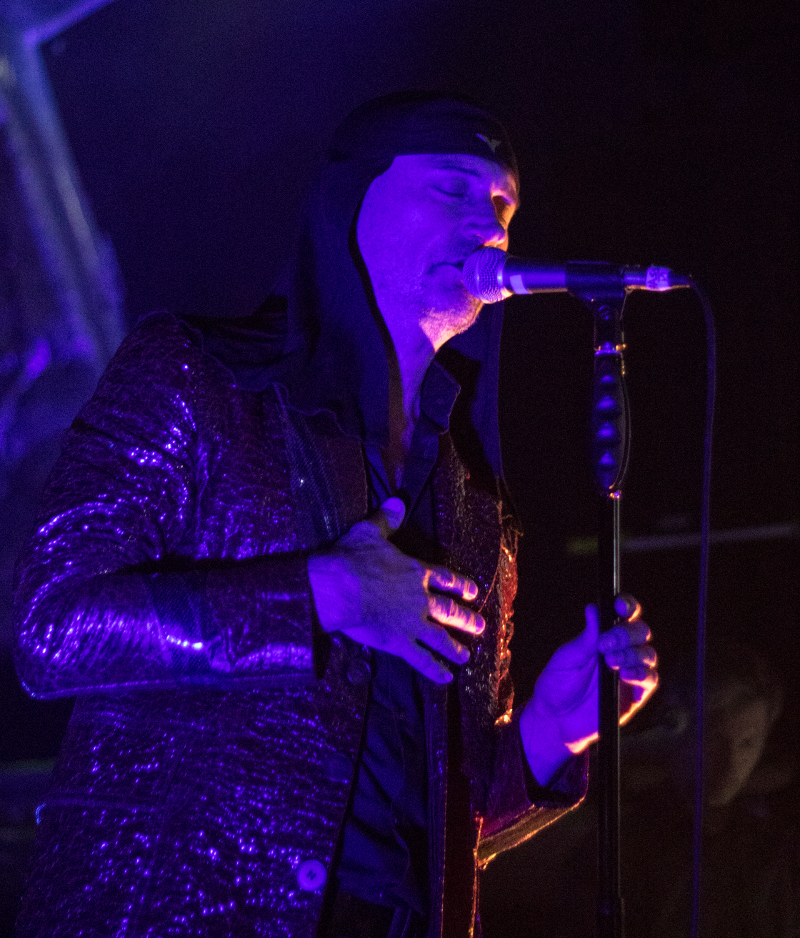 For the next hour or so, we are led through choice cuts from the new album: the sinister nursery rhyme of “Ein Untergang”, the carrot-eating electronic throb of “Das Glück”, the Wagner prelude-esque sweep of “Die Unschuld”. A notable highlight comes in the form of the glorious “Ein Verkündiger”, particularly when Fras takes a quick break from his larynx-shredding narration and begins sharpening two huge machetes against each other, the ominous scrape of metal on metal enough to set the teeth on edge.
For the next hour or so, we are led through choice cuts from the new album: the sinister nursery rhyme of “Ein Untergang”, the carrot-eating electronic throb of “Das Glück”, the Wagner prelude-esque sweep of “Die Unschuld”. A notable highlight comes in the form of the glorious “Ein Verkündiger”, particularly when Fras takes a quick break from his larynx-shredding narration and begins sharpening two huge machetes against each other, the ominous scrape of metal on metal enough to set the teeth on edge.
Perhaps the most perfect moment of son et lumière synchronisation comes when Mina Špiler arrives on stage. Looking immaculate in a dark shawl-like dress, she sways gently, attuning herself to the honied orchestral swells that begin the apocalyptic “Vor Sonnen-Aufgang”, before humming us her atomic berceuse. Her vocal delivery is absolutely perfect, as precise as the most well-calibrated German machine tool, whilst behind her on screen enormous nuclear mushroom-clouds detonate slowly in all their utterly obscene beauty. When she reaches the line “Hier kommt die Sonne” (“Here comes the sun”), an overhead spotlight throws a sudden beam of golden light onto her face. The world begins to end, not with a bang, but with a lullaby.
I had been slightly concerned that, in contrast to the huge pile-driving Laibach sound of yore, the detailed quietness and understatement of the new material might sit uncomfortably in a live arena such as this. It may be one thing to witness it in the genteel and amniotic womb of The Barbican, where the sound washes gently out over a beach of polite and respectful silence, but here, with a “Can I just squeeze through mate?” three-pint-carrier pitching up at your shoulder every six minutes, it might have proven slightly more challenging. Wisely, though, the band have chosen to gear the material up sonically, rather than expect the audience to throttle down conversationally. Without losing any of the subtle tonality of the music, they give it a noticeable step-change in auditory power in order to compensate.viiŠpiler then leads us away from the new album, through “Parnassus” and “Cold Song”, their incredible take on the aria of the “Cold Genius” from Henry Purcell‘s 1691 opera King Arthur (that would have been a good one to have thrown out in Pyongyang…). Špiler is mesmeric in her performance, the elegant yang to Fras’ rumbling yin. There follows a flurry of knock-out punches drawn from the band’s extensive back catalogue: “Anti-Semitism” (dedicated to the Slovenian poet Tomaž Šalamun); “Brat Moj”; “Hell: Symmetry” from WAT; Kapital’s “Les Privilege Des Morts” (which Fras charmingly sings from notes on a small, illuminated music stand); and “Ti, ki izzivaš” from Rekapitulacija 1980-1984.
Brought back for an encore, we are treated to “Bossanova” and the Blind Lemon Jefferson cover “See That My Grave Is Kept Clean”, both from 2014’s monumental Euro-horror compendium Spectre.
Fras silently introduces the band, before they file neatly off-stage, taking their leave of us to the strains of some Ernie Freeman style Hammond organ, and it’s a last treat to see a clutch of beefy, black-leather-clad Laibach weirdos grooving away like they are at The Eve Club in 1961. I swear, too, that one of them is Lothar Matthäus in a long, leather trench coat, white Laibach cross armband stitched on with evident pride.I make my way back along Upper Street, trying to growl out “Der Mensch ist ein Seil, geknüpft zwischen Tier und Übermensch”vii in the same sub-sonic register as Fras. And failing miserably, I might add.
*
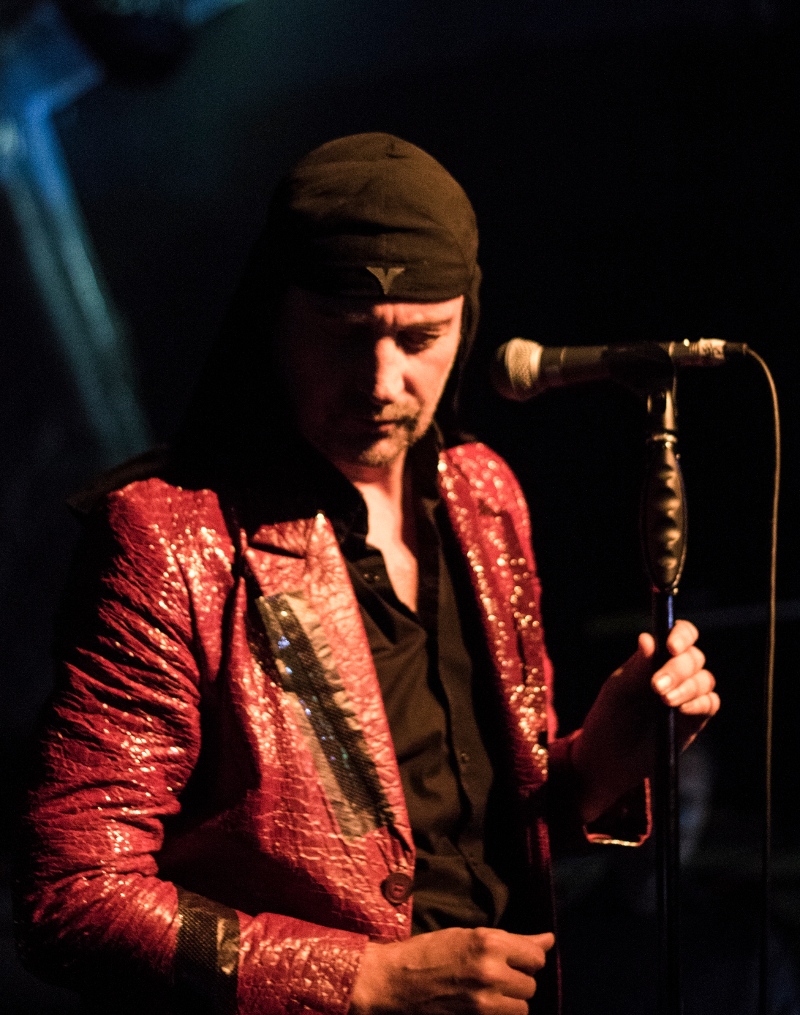
Yet it would be a mistake to regard their unreliable narration as the medium. I can’t help but feel that it is the very message itself. Yes, Laibach are musicians, whose primary aim is to entertain, but they are also, clearly, artists, and for all the KLF-style jolly-japery of the concert in North Korea, there was a deadly serious point there. At a time when the West seems so unwilling, or unable, to mount a robust defence of Enlightenment values, Laibach play the role of the sheep farmer in American Werewolf In London, warning us to “Keep off the moors, stick to the roads”. To stray too far from the road of eudaimonia risks becoming lost on the moors of unreason, where we fall easy prey to the wolf of totalitarianism, whichever shape it may have shifted into. The consequences of that are – always – murderous.
Laibach and think of the gulag…
-Words: David Solomons-
-Pictures: Dave Pettit-
i “Dark. Dark is the night”.
ii Can you imagine the almost unbelievable amount of ideological vetting that must have had to take place before such an event was permitted to go ahead? That Laibach managed to actually pass such vetting surely took their unique brand of Situationist humour to dizzying new heights.
iii Most unsettling of all is the large bar of soap sitting inertly on its dais, like some kind of grotesque Rorschach blot. Is it here because Milan Fras wishes to share his love of bath time with us? Or is it a silent reminder of the obscene wartime experiments at the Danzig Anatomical Institute run by Rudolph Spanner, when the fat rendered from corpses from local prisons and mental institutions was processed into soap? (Nuremberg Trial Proceedings Vol. 7, SIXTY-SECOND DAY, 19 February 1946, Morning Session.) Mercifully, it never reached any level of industrial production and remained a small, isolated abhorrent experiment. The memorial plaque now in Gdańsk states “People brought this fate upon people…”
iv Linda Bellos, take a bow… So, too, the Anarchist Bookfair 2018.
v The Buttholes Surfers’ glorious use of stomach-churning medical operation footage was surely the Gloria in Excelsis Deo example. Who could forget the scalpel making the first delicate incision into the gangrenous scrotal sack that we were presented with at ULU..?
vi They reminded me pleasantly of the old credits to The World About Us.
vii In this respect, one of the most memorable and uncompromising dynamics that I ever remember witnessing was that of Nottingham’s Savoy Grand playing at the old Vortex in Stoke Newington sometime in the late 1990s. Known for performing their delicate, reflective music at such minimal levels of volume that even a mouse scurrying about in the wainscoting was likely to overpower it, the sheer quietness of the set forced even the most ardent talkers into a reluctant silence, since even a whisper was patently enough to drown out the music. The audience was visibly leaning in to try and hear better.
vii “Man is a rope, knotted between animal and Superman”.
